|
|
|
Sort Order |
|
|
|
Items / Page
|
|
|
|
|
|
|
| Srl | Item |
| 1 |
ID:
105653


|
|
|
|
|
| Publication |
2011.
|
| Summary/Abstract |
When former US ambassador to Pakistan, Wendy Chamberlin, said of the US, 'We are a player in the Pakistani political system', she was pointing out how challenging it is to achieve US policy goals under the kinds of volatile political conditions engulfing that country. In late 2007, the Bush administration was banking on the political future of former Prime Minister Benazir Bhutto, who had recently returned to Pakistan, and was still providing President Pervez Musharraf with the substantial aid and support it had been giving him since 9/11. And yet by early 2008, Benazir Bhutto was dead, assassinated as she rose from her car to greet crowds of supporters, and Pervez Musharraf was a political liability, since his party had suffered a resounding defeat in the February 2008 election. These events demonstrated that even the foreign policies of a country as powerful as the US can be scuttled by the flux and flow of local power politics.
|
|
|
|
|
|
|
|
|
|
|
|
|
|
|
|
| 2 |
ID:
105643
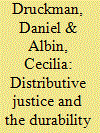

|
|
|
|
|
| Publication |
2011.
|
| Summary/Abstract |
This study explores the relationship between principles of distributive justice (DJ) and the durability of negotiated agreements. Sixteen peace agreements negotiated during the early 1990s were coded for the centrality of each of four principles of DJ - equality, proportionality, compensation, and need - to the core terms of the agreement. The agreements were also assessed on scales of implementation and durability over a five-year period. Another variable included in the analysis was the difficulty of the conflict environment. These data were used to evaluate three sets of hypotheses: the relationship between DJ and durability, the role of the conflict environment, and types of DJ principles. The results obtained from both statistical and focused-comparison analyses indicate that DJ moderates the relationship between conflict environments and outcomes: when principles of justice are central to an agreement, the negative effects of difficult conflict environments are reduced; when principles are not central, the negative effects of difficulty are heightened. These relationships are accounted for primarily by one of the four DJ principles - equality. Implications of these findings are discussed along with a number of ideas for further research.
|
|
|
|
|
|
|
|
|
|
|
|
|
|
|
|
| 3 |
ID:
105639
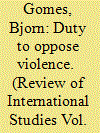

|
|
|
|
|
| Publication |
2011.
|
| Summary/Abstract |
Although the non-intervention rule is often defended as a guarantee of international order, rigid adherence to it cannot be morally justified when governments commit or permit atrocities within their territory. In such cases, intervention is permissible and may even be obligatory. Drawing on the ideas of Rousseau, Kant, and to a lesser extent Hegel, this article examines the grounds of the argument for humanitarian intervention, demonstrating that intervention is in principle not only permissible but obligatory when considered philosophically. The right to intervene can be grounded on common morality, the protection of sovereignty and the coerciveness of justice. The duty to intervene rests on a respect for humanity and the conceptual relationship between rights and duties. Considering these two lines of argument shows that humanitarian intervention can be conceived as a duty that states can be reasonably required to perform.
|
|
|
|
|
|
|
|
|
|
|
|
|
|
|
|
| 4 |
ID:
105648
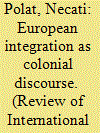

|
|
|
| 5 |
ID:
105640
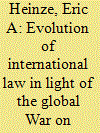

|
|
|
|
|
| Publication |
2011.
|
| Summary/Abstract |
This article explores how various aspects of the 'global War on Terror' may be affecting the future development of international law on the use of force. I examine these effects within three areas of international law - the law of anticipatory self-defence, the law of self-defence against non-state actors, and the applicability of international humanitarian law to non-state armed groups. Only in the latter two areas do I find evidence that international law is evolving to accommodate the new realities of global terror. While such developments in the law reflect the supposed need by states to use military means to combat terrorism, they also seem to confer at least a limited international legal personality upon terrorist groups such as Al-Qaeda. This not only indicates a shift in the basis for legal personality, but also potentially undermines the legitimacy of international law and frustrates states' efforts at combating terrorism.
|
|
|
|
|
|
|
|
|
|
|
|
|
|
|
|
| 6 |
ID:
105645
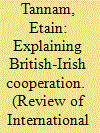

|
|
|
|
|
| Publication |
2011.
|
| Summary/Abstract |
This article applies rational institutionalism, to the case of the British-Irish relationship. Hypotheses are drawn about the role of institutions in advancing cooperation. In section two an overview and analysis of British-Irish agreements and policymaking processes are provided. In section three, the role of institution-building in causing British-Irish cooperation is highlighted. In conclusion, the enduring relevance of rational institutionalism to the British-Irish case is highlighted and its potential to understand conflict in the 21st century is stressed.
|
|
|
|
|
|
|
|
|
|
|
|
|
|
|
|
| 7 |
ID:
105650
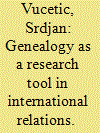

|
|
|
| 8 |
ID:
105652
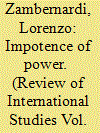

|
|
|
|
|
| Publication |
2011.
|
| Summary/Abstract |
When former US ambassador to Pakistan, Wendy Chamberlin, said of the US, 'We are a player in the Pakistani political system', she was pointing out how challenging it is to achieve US policy goals under the kinds of volatile political conditions engulfing that country. In late 2007, the Bush administration was banking on the political future of former Prime Minister Benazir Bhutto, who had recently returned to Pakistan, and was still providing President Pervez Musharraf with the substantial aid and support it had been giving him since 9/11. And yet by early 2008, Benazir Bhutto was dead, assassinated as she rose from her car to greet crowds of supporters, and Pervez Musharraf was a political liability, since his party had suffered a resounding defeat in the February 2008 election. These events demonstrated that even the foreign policies of a country as powerful as the US can be scuttled by the flux and flow of local power politics.
|
|
|
|
|
|
|
|
|
|
|
|
|
|
|
|
| 9 |
ID:
105637


|
|
|
|
|
| Publication |
2011.
|
| Summary/Abstract |
This article explores the process by which norms of international climate governance have diffused and evolved over time. The author develops a constructivist explanation for observed normative shifts in international climate governance. This explanation highlights the importance of building and maintaining congruence between domestic conditions and international norms. Due to the inherently fluid nature of both domestic conditions and international norms, it is argued that normative congruence building should be understood as an integral and iterative aspect of the norm diffusion process. This argument is substantiated through an analysis of the norm diffusion process in the context of India: a state commonly identified as an important player in international climate change politics, but one that has received surprisingly little scholarly attention in this area.
|
|
|
|
|
|
|
|
|
|
|
|
|
|
|
|
| 10 |
ID:
105641


|
|
|
|
|
| Publication |
2011.
|
| Summary/Abstract |
he aim of this article is to provide International Relations (IR) theorists with a better understanding of law. This is important for all IR theorists, not just those who focus on international law, because the legalistic way of viewing the world colours all aspects of our world, from teaching us what justice is and providing the means to achieve it, to framing our understanding of human relations and giving us the language of rights with which to articulate it. This article has two main goals: first, to question our own assumptions about law; and second, to introduce IR theorists to the basics of legal methodology and demonstrate how law actually operates.
|
|
|
|
|
|
|
|
|
|
|
|
|
|
|
|
| 11 |
ID:
105646
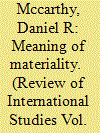

|
|
|
|
|
| Publication |
2011.
|
| Summary/Abstract |
Gramsican approaches in International Relations (IR) have sought to outline the relationship between ideas and material forces in the construction of world order. Scholars working within this broad school have sought to emphasise that ideas are material forces, and must be considered as concrete historical structures (Cox, 1987) central to the establishment of particular historical and hegemonic blocs. This literature has primarily focused on the discursive construction of hegemony by international elites and the impact this has on political practices. While these insights are important in understanding the construction of world order, it is necessary to extend them to include the creation of actual physical structures - that is, it is vital to link the ideational aspects of hegemony with actual material processes. I will argue that a consideration of the role of technology provides an ideal vehicle for this process, building on the preliminary work of Bieler and Morton in this regard (2008). Technological structures are the product of particular cultural values and embed these cultural values within their very structure. Physical material factors thereby express ideational values constructed by specific social forces. Social practices are thus not only a function of the dominance of certain ideological formations, but also the product of the material environment itself and the manner in which the human metabolism with nature must function through these physical constructions.
|
|
|
|
|
|
|
|
|
|
|
|
|
|
|
|
| 12 |
ID:
105644


|
|
|
|
|
| Publication |
2011.
|
| Summary/Abstract |
This article is concerned with a particular debate in mediation literature, revolving around the merit and necessity of power as a strategy employed by third parties in their efforts to negotiate a successful resolution to conflict. We argue that by subscribing to a one-dimensional spectrum of pure-to-power mediation, students of mediation have neglected the development of how power is conceptualised and operates within the changing dynamics of conflict and its mediation.
We therefore seek to redefine the concept of power mediation to project a closer fit between conflicting parties' understanding of their situation and the methods, aims and motivations of their mediators. Breaking away from the existing pure-power spectrum, we propose a heuristic framework that includes four distinct types of power mediation, defined here as real, made, critical and structural power. The contribution of our heuristic model is threefold. First, it assists us in asking the most basic question of social science research, 'of what is this a case', which in turn ought to lead to a more sophisticated observation of mediation instances. Concurrently, through the frame of 'power', it establishes common understanding of observable phenomena that makes the study of mediation more accessible to the wider audience beyond students of our modest literature. Finally, the synthesis of epistemological and ontological inquiry of conflict and power with the established International Relations (IR) approaches of realism(s), constructivism, critical discourse and structuralism, allows respective real, made, critical and structural types of mediation power to be tested.
|
|
|
|
|
|
|
|
|
|
|
|
|
|
|
|
| 13 |
ID:
105654
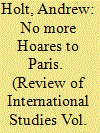

|
|
|
|
|
| Publication |
2011.
|
| Summary/Abstract |
Italy's invasion of Abyssinia in October 1935 prompted a major European crisis. This article applies the main theories of foreign policy analysis to the British Government's handling of this crisis. It argues that bureaucratic politics existed, but had little impact on outcomes. Domestic politics had more influence, but did not provide detailed instructions on how to act. The perceptions of key actors, informed by reasoned judgement, determined this. Fears of the threat posed by rival states coalesced with concerns about Britain's own military weakness, leading decision-makers to emphasise the need to act in tandem with France. British policy was therefore motivated by the tension between the public's desire to see action against Italy and the Government's wish to minimise any breach with her allies. These findings highlight the weaknesses of the bureaucratic politics model and show how domestic politics can affect foreign policy outcomes. They also demonstrate the interaction between rational analysis defined in terms of reasoned judgement, and actors' perceptions. It is thus argued that benefits are to be gleaned from combining these theories.
|
|
|
|
|
|
|
|
|
|
|
|
|
|
|
|
| 14 |
ID:
105649
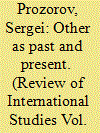

|
|
|
|
|
| Publication |
2011.
|
| Summary/Abstract |
The article ventures a critique of the logic of 'temporal othering' in contemporary International Relations (IR) theory. Originally articulated in the field of European integration, this logic presupposes a possibility for a political community to constitute its identity without any spatial delimitation by means of casting as Other its own past, whose repetition in the future it seeks to avoid. While the image of contemporary Europe as 'othering' its own past has been subjected to empirical criticism, this article makes a conceptual argument for the indissociability of temporal and spatial aspects in any act of othering. Drawing on Alexandre Kojève's reading of Hegel, I argue that any historical action is necessarily spatiotemporal, combining the abstraction of temporal negation with the concrete actuality of a negated spatial being. Alternatives to the logic of sovereign territoriality are therefore not to be sought in the temporal aspect of othering, but rather by pursuing the possibility of self-constitution in the absence of any negating action whatsoever. The article concludes with an outline of such an alternative ethos, developed on the basis of Giorgio Agamben's reconstruction of the Hegelian-Kojèvian problematic of the end of history and his theory of the subject.
|
|
|
|
|
|
|
|
|
|
|
|
|
|
|
|
| 15 |
ID:
105655


|
|
|
| 16 |
ID:
105635
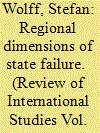

|
|
|
|
|
| Publication |
2011.
|
| Summary/Abstract |
The academic and policy debate on state failure reaches back to the early 1990s. Since then, its empirical and analytical sophistication has grown, yet the fact that state failure is a regional phenomenon, that is, that it occurs in clusters of geographically contiguous states, has largely been overlooked. This article first considers the academic and policy debates on state failure in the Political Science/International Relations and Development Studies literatures, and offers a definition of state failure that is derived from the means of the state, rather than its ends. Subsequently engaging with existing scholarship on the concept of 'region' in international security, the article develops a definition of 'state failure regions'. Further empirical observation of such regions and additional conceptual reflections lead to establishing an analytical model for the study of state failure regions and allow indentifying a number of concrete gains in knowledge and understanding that can result from its application.
|
|
|
|
|
|
|
|
|
|
|
|
|
|
|
|
| 17 |
ID:
105634


|
|
|
|
|
| Publication |
2011.
|
| Summary/Abstract |
With the increasing influence of theocrats and other religious actors on policymakers and masses, recognising the agency of the clergy is crucial. This article uses the 'epistemic communities' framework to place the religious 'agents' in contemporary politics and it shows how hermeneutics can be treated as a form of 'episteme'. Until recently, this framework has been used to explain how scientific communities affect policymaking. Using the cases of South Africa and Northern Ireland, this article claims that religious actors, especially with their shared set of normative and principled beliefs as well as shared norms of validity, also meet the requirements of the epistemic community category. The employment of this established IR framework in theorising religious politics has the potential to shed light not only on peacebuilding and mediation, but also violent movements and terrorist organisations that use religion as justification.
|
|
|
|
|
|
|
|
|
|
|
|
|
|
|
|
| 18 |
ID:
105656


|
|
|
|
|
| Publication |
2011.
|
| Summary/Abstract |
This article explores the account of international hospitality found in the natural law tradition from Vitoria to Kant. Rather than limit itself to intellectual history, the focus here is on a more enduring theme: the double-bind of hospitality which the natural lawyers encountered in seeking to find a place for the welcome of the foreigner in the 'law of nations'. Although these thinkers agreed on a natural right of communication, this proved destabilising, even destructive, of the property claims by which hosts establish their domain as properly theirs in the first place. All struggled with this double-bind, though this took different forms, from the concern that the law of hospitality might thereby justify colonial appropriation to fears for how it could threaten sovereignty. Two thinkers arguably find a way out of the double-bind of right of communication-right of property in hospitality, but sacrifice the law of hospitality in the process: Pufendorf, subordinating communication to property, turns hospitality into charity and thereby effectively denies it status as a law of nature; Kant, putting communication first, makes hospitality a matter of right, not philanthropy, but also sees it as instrumental to the development of a global civil condition, where it would be redundant.
|
|
|
|
|
|
|
|
|
|
|
|
|
|
|
|
| 19 |
ID:
105651
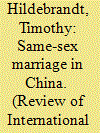

|
|
|
|
|
| Publication |
2011.
|
| Summary/Abstract |
Using the case of same-sex marriage in China, this article explores two fundamental questions: What motivates a non-democratic state to promulgate a progressive human rights policy? More importantly, when a non-democratic state adopts such policies, what is the impact on activism? I argue that same-sex marriage legislation could be used strategically to improve China's human rights reputation. While this would extend a pinnacle right to gays and lesbians, the benefits might not outweigh the costs: I show that when imposed from above, a same-sex marriage law would incur opportunity costs on activism; the passage of this progressive policy would eliminate an important issue around which the Lesbian, Gay, Bisexual and Trans-gender/-sexual (LGBT) community might develop. Moreover, even if such policy is promulgated, the right to marry will do little to challenge the larger social pressures that make life difficult for LGBT Chinese.
|
|
|
|
|
|
|
|
|
|
|
|
|
|
|
|
| 20 |
ID:
105638
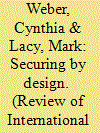

|
|
|
|
|
| Publication |
2011.
|
| Summary/Abstract |
This article investigates how modern neo-liberal states are 'securing by design' - harnessing design to new technologies in order to produce security, safety, and protection. We take a critical view toward 'securing by design' and the policy agendas it produces of 'designing out insecurity' and 'designing in protection' because securing by design strategies rely upon inadequate conceptualisations of security, technology, and design and inadequate understandings of their relationships to produce inadequate 'security solutions' to ready-made 'security problems'. This critique leads us to propose a new research agenda we call Redesigning Security. A Redesigning Security Approach begins from a recognition that the achievement of security is more often than not illusive, which means that the desire for security is itself problematic. Rather than encouraging the design of 'security solutions' - a securing by design - a Redesigning Security Approach explores how we might insecure securing by design. By acknowledging and then moving beyond the new security studies insight that security often produces insecurity, our approach uses design as a vehicle through which to raise questions about security problems and security solutions by collaborating with political and critical design practitioners to design concrete material objects that themselves embody questions about traditional security and about traditional design practices that use technology to depoliticise how technology is deployed by states and corporations to make us 'safe'.
|
|
|
|
|
|
|
|
|
|
|
|
|
|
|
|
|
|
|
|
|